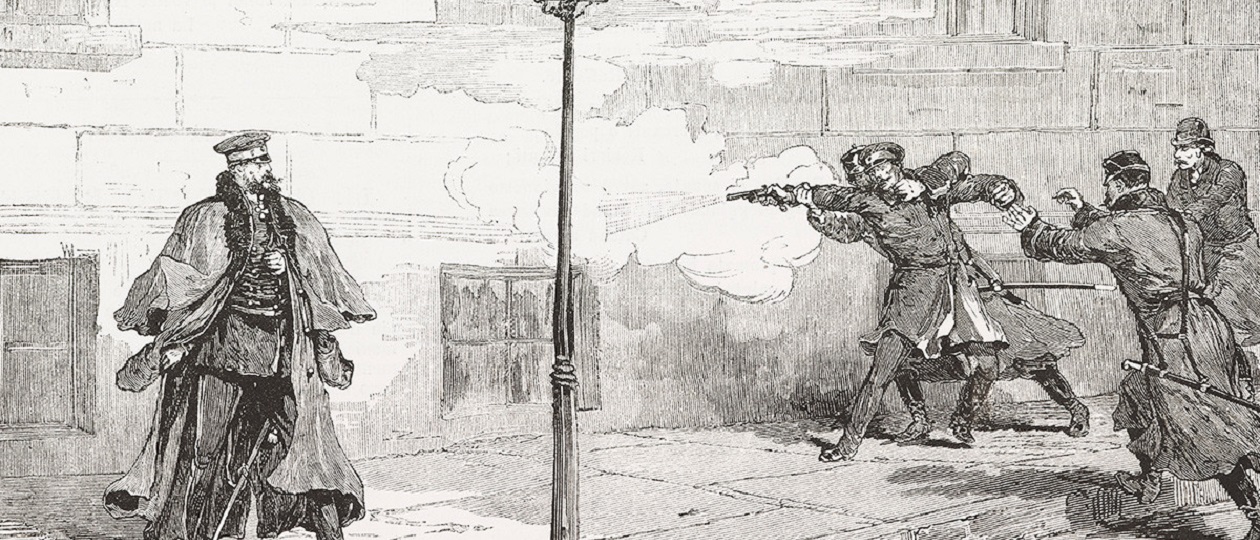
One way to look at the history of political terrorism in the Russian Empire is to divide it into two main periods. The period of the Great Known runs from 1879-1894. It is the history of the People’s Will (Народная Воля) whose members assassinated Tsar Alexander II on March 1, 1881.
The period of the Great Unknown lasted from 1901-1911. It is the history of the terrorists from many political parties and movements who killed or wounded about 17,000 people in this decade. [1, p. 21]
When many historians write about terrorism in Russia, they generally include the People’s Will assassination of Tsar Alexander II. However, the period of mass terrorism gets little coverage apart from mentions about some spectacular assassinations carried out by the Battle Organization of the Party of Socialists-Revolutionaries (SRs).
The assassination of Tsar Alexander II was a key turning point in Russian history. It showed revolutionaries that there was no turning back and that any hopes about the government reforming itself were illusions. The assassination did not put an end to liberals hoping to work with leftists in gaining political freedom. For conservatives, the assassination proved that Tsar Alexander’s reforms had paved the way for revolutionary chaos and that more severe measures were needed to restore order. However, conservatives also found out that the government did not really want their support because it dissolved the loyalist organization the Sacred Brotherhood (Священная дружина) on suspicions that it was an aristocratic front for a constitution.
These and many other factors make the story of the People’s Will the Great Known period in the history of political terrorism in the Russian Empire.
The massive wave of terrorism between 1901-1911 is a Great Unknown not just in the history of Russian terrorism but more significantly in the history of European and world terrorism. Historians still tend to concentrate on terrorist acts carried out by anarchist and nationalist terrorists between 1870-1914.
Anarchist and nationalist terrorism claimed the lives of many victims. Dutch researcher Beatrice De Graaf calculated that anarchists between 1880-1914 killed 160 people and wounded more than 500 people in Europe and the United States. [2, p. 144] Anarchist assassinations of heads of state received the most attention.
Even more people were victims of nationalist terrorism, especially in the Balkans. For example, the population of Macedonia was only three million people in 1903. In 1907, British diplomats reported that there were 1,370 cases of violent deaths in Macedonia — four each day. [3, p. 309]
Terrorism in Russia between 1860 and 1900 took the lives of about 100 people. [1, p. 3] This suggests that the level of terrorism in Russia was somewhat like European countries. However, the total of 17,000 people killed or wounded set a European-wide record for terrorism. This record remained unbroken until the late 20th century. Terrorism in Turkey claimed far more lives. The Turkish Council of National Security recorded 43,000 terrorist incidents between 1978-1982 with 18 victims per day. Between 30,000-35,000 Turkish citizens were killed in terrorist attacks between 1984-2000. [4, pp. 155-157] Although the history of terrorism in Turkey has certain similarities with terrorism in the Russian Empire, there are also big differences thanks to the different historical situations. However, what happened in both countries was the fact that terrorism became a virtually expected feature of daily political life.
Too many aspects of Russian terrorism in the early 20th century have been ignored. These factors include: the sheer massiveness of terrorism; the number of political parties and movements participating in it; the mass criminalization of many liberals and some conservatives by their support for terrorism; the mass ambivalence of conservatives about helping the government fight terrorism; the ability of Russian terrorists to convince foreigners that they were freedom fighters; the degree of foreign support for terrorists in Russia, the eagerness of right-wingers to take up terrorism; the multiethnic and multireligious makeup of Russia’s terrorists; the massive participation of women, young adults and teenagers in terrorist acts; the willingness of members of the government and political movements to regard terrorism as a useful means of attaining their political goals.
All these aspects should have made the history of terrorism in Russia between 1901-1911 a major chapter in the history of world terrorism. Instead, too many people still think that mass terrorism and government wars against terrorism began on September 11, 2001.
Let’s look at more reasons why we are dealing with the Great Unknown.
Sources Used
- Geifman, Anna. Thou shalt kill: revolutionary terrorism in Russia, 1894-1917. Princeton NJ: Princeton University Press, 1993. Русский перевод в электронной форме. Гейфман, Анна. Революционный террор в России, 1894-1917. Москва: КРОН-ПРЕСС, 1997. https://royallib.com/book/geyfman_anna/revolyutsionniy_terror_v_rossiihtml
- De Graaf, Beatrice. The Black International Conspiracy as Security Dispositive in the Netherlands, 1880-1900. 2. Historical Social Research / Historische Sozialforschung , 2013, Vol. 38, No. 1 (143), Security and Conspiracy in History, 16th to 21st Century (2013), pp. 142-165.
- Gawrych, George W. The Culture and Politics of Violence in Turkish Society, 1903-14. Middle Eastern Studies, Jul., 1986, Vol. 22, No. 3 (Jul., 1986), pp. 307-330.
- Rodoplu, Ulkumen MD, Jeffrey Arnold, MD, and Gurkan Ersoy, MD. Terrorism in Turkey. Prehospital and Disaster Management. 2003;18(2), рр. 152–160.





